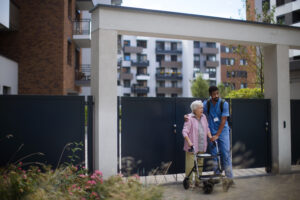Thirteen Champions ESG with Groundbreaking Customer Loyalty Programme
In an innovative move that aligns directly with ESG objectives, Thirteen Housing Group has launched a pioneering customer loyalty initiative—designed not for profit margins, but for people, places, and long-term community resilience
Caregiver walking with senior woman client in front of her home.
- Retention rates after 9 months are 12 times better than the norm—dramatically reducing costly voids.
- Engagement surveys are seeing a 47% response rate—well above sector averages.
- General surveys have seen a 16.5-fold increase in responses.
- 100% of participating customers have registered for digital self-service.
- Over half of all members have claimed a benefit, with each customer averaging more than 3 offers—despite the challenges posed by the pandemic.
The programme’s architect, David Ripley, joined Thirteen with a clear mission: to enhance customer retention, strengthen brand trust, and support wider community cohesion.
“Our goal was to create something meaningful in a sector that doesn’t traditionally adopt commercial loyalty models. But customer churn—what we call turnover—has real human and financial costs. By seeing this through a social value lens, we’re now reducing turnover and increasing community wellbeing,” David explains.
Thirteen, which operates in the North East—home to some of the UK’s most deprived communities—has built the scheme not just as a tech solution, but as part of a cultural shift. Alongside this pilot, the organisation has invested in staff training and even opened a community concept store to support local engagement.
“We’re committed to scaling this initiative following the pilot. For us, loyalty is about trust, wellbeing, and helping customers stretch their budgets with support on everyday essentials like food and energy.”
To bring this concept to life, Thirteen partnered with loyalty specialists Orangutan. Tim Peniston-Bird, Head of Loyalty, believes the success lies in understanding human behaviour:
“Communities thrive when people feel connected, safe and valued. By nurturing those natural instincts and recognising positive actions—like attending local events, reporting graffiti early, or supporting neighbours—we reinforce the behaviours that lead to better outcomes for everyone.”
The programme uses a points-based system to reward community-minded behaviour, such as taking part in litter picks, charity initiatives or tenant forums. Rewards help residents cut costs, while the act of participating fosters new habits and strengthens community norms.
Critically, the programme avoids incentivising the wrong behaviours. For example, instead of rewarding online fault reporting (which risks over-reporting), residents earn points for completing a home maintenance check—a proactive step that naturally identifies real issues without encouraging unnecessary claims.
A defining feature of the scheme is its frontline focus. Housing officers use the programme not only to build rapport, but to champion wellbeing, sustainability, and mutual respect.
While loyalty schemes are common in the private sector, Thirteen is one of the first housing associations to reimagine the model for social value. And the results are already making a measurable impact:
- Retention rates after 9 months are 12 times better than the norm—dramatically reducing costly voids.
- Engagement surveys are seeing a 47% response rate—well above sector averages.
- General surveys have seen a 16.5-fold increase in responses.
- 100% of participating customers have registered for digital self-service.
- Over half of all members have claimed a benefit, with each customer averaging more than 3 offers—despite the challenges posed by the pandemic.
The programme’s architect, David Ripley, joined Thirteen with a clear mission: to enhance customer retention, strengthen brand trust, and support wider community cohesion.
“Our goal was to create something meaningful in a sector that doesn’t traditionally adopt commercial loyalty models. But customer churn—what we call turnover—has real human and financial costs. By seeing this through a social value lens, we’re now reducing turnover and increasing community wellbeing,” David explains.
Thirteen, which operates in the North East—home to some of the UK’s most deprived communities—has built the scheme not just as a tech solution, but as part of a cultural shift. Alongside this pilot, the organisation has invested in staff training and even opened a community concept store to support local engagement.
“We’re committed to scaling this initiative following the pilot. For us, loyalty is about trust, wellbeing, and helping customers stretch their budgets with support on everyday essentials like food and energy.”
To bring this concept to life, Thirteen partnered with loyalty specialists Orangutan. Tim Peniston-Bird, Head of Loyalty, believes the success lies in understanding human behaviour:
“Communities thrive when people feel connected, safe and valued. By nurturing those natural instincts and recognising positive actions—like attending local events, reporting graffiti early, or supporting neighbours—we reinforce the behaviours that lead to better outcomes for everyone.”
The programme uses a points-based system to reward community-minded behaviour, such as taking part in litter picks, charity initiatives or tenant forums. Rewards help residents cut costs, while the act of participating fosters new habits and strengthens community norms.
Critically, the programme avoids incentivising the wrong behaviours. For example, instead of rewarding online fault reporting (which risks over-reporting), residents earn points for completing a home maintenance check—a proactive step that naturally identifies real issues without encouraging unnecessary claims.
A defining feature of the scheme is its frontline focus. Housing officers use the programme not only to build rapport, but to champion wellbeing, sustainability, and mutual respect.
